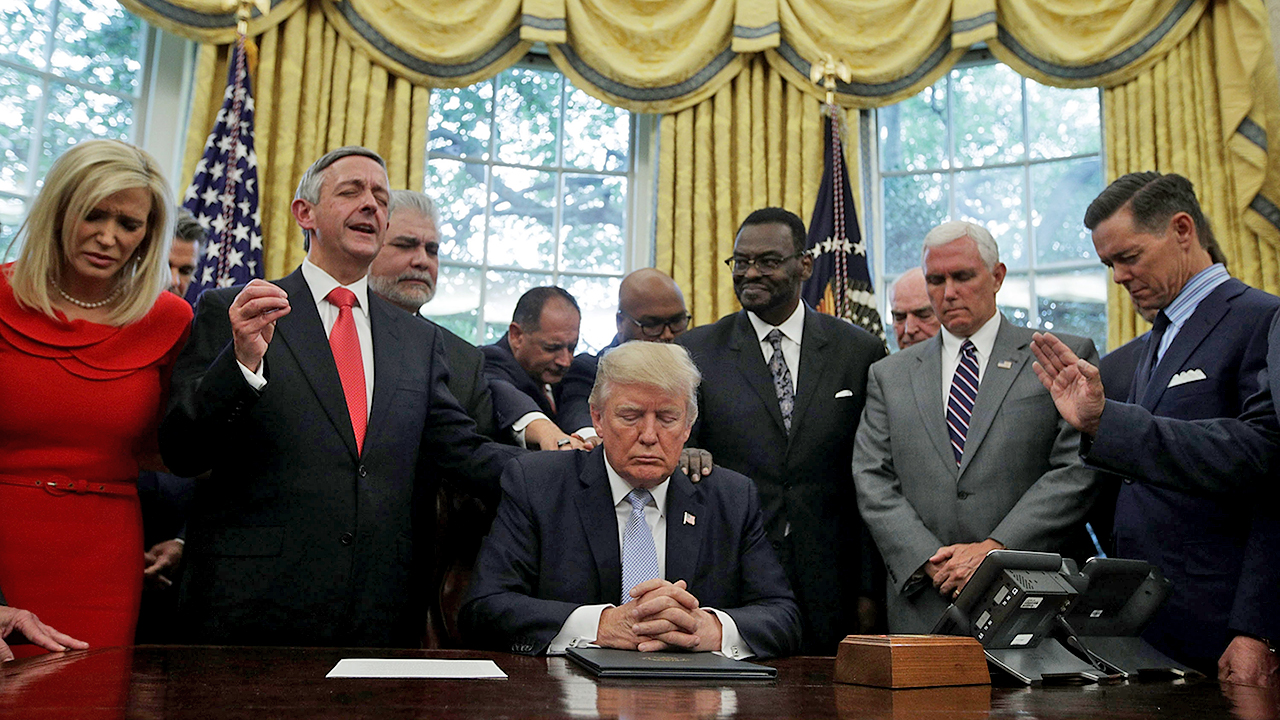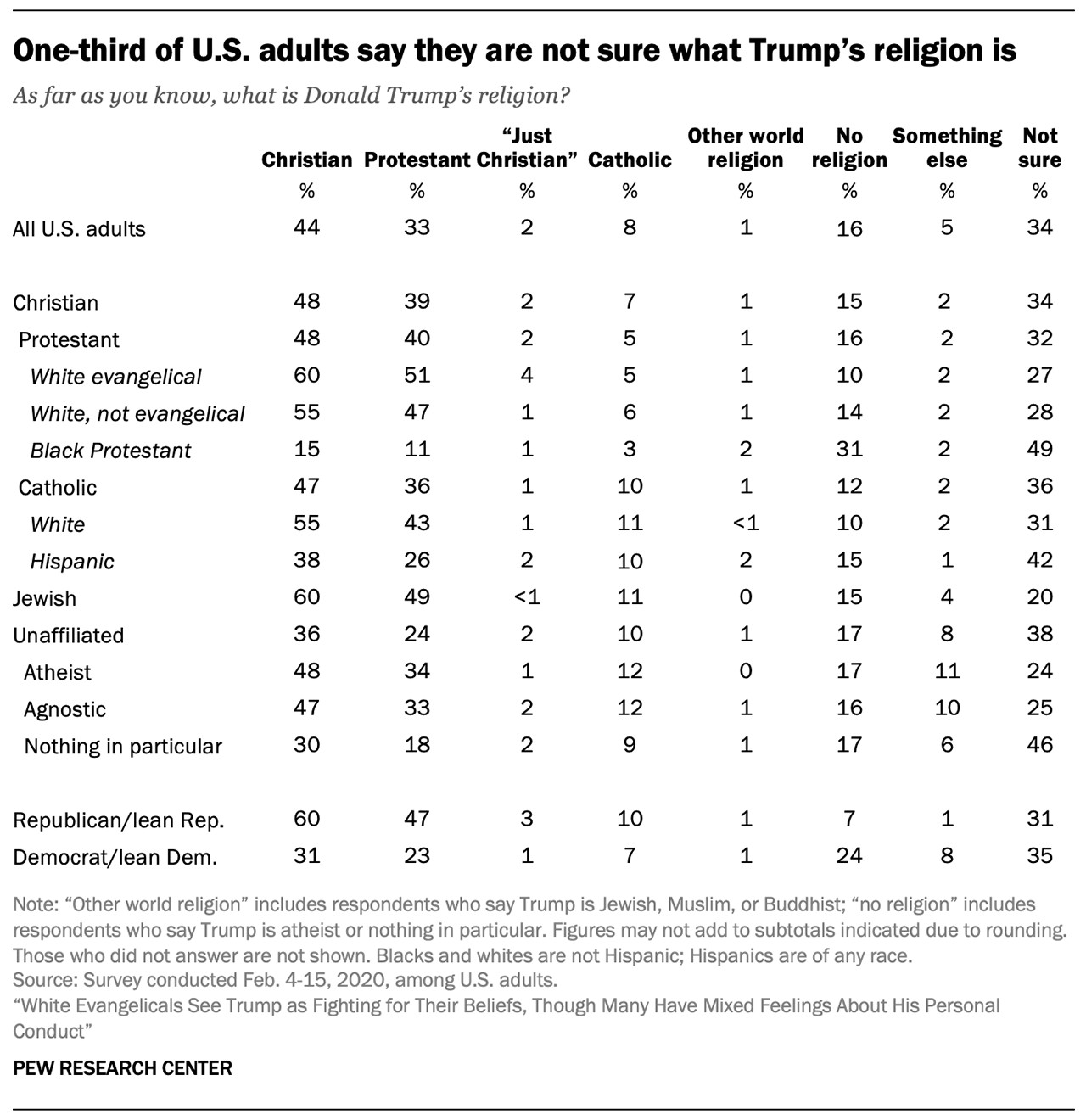
President Donald Trump has often used religious language while in office, and he has surrounded himself with evangelical leaders and supported conservative Christian causes. But Trump’s personal religious beliefs and practices have not been as public.
Indeed, half of U.S. adults either say they’re not sure what Trump’s religion is (34%) or that he has no religion (16%), while just 33% say he’s Protestant.
And Americans overall don’t think Trump is particularly religious: A majority say Trump is “not too” (23%) or “not at all” (40%) religious, while 28% say he’s “somewhat” religious and only 7% say he’s “very religious,” according to a new Pew Research Center survey.

The findings in this post are drawn from a new survey exploring the intersection of religion and politics in the U.S. The survey of 6,395 U.S. adults was conducted Feb. 4 to 15. All respondents to the survey are part of Pew Research Center’s American Trends Panel (ATP), an online survey panel that is recruited through national, random sampling of residential addresses. This way nearly all U.S. adults have a chance of selection. The survey is weighted to be representative of the U.S. adult population by gender, race, ethnicity, partisan affiliation, education and other categories. Read more about the ATP’s methodology.
Here are the questions used for the report, along with responses, and its methodology.
A similar share of Americans see Democratic candidate Bernie Sanders as religious. (Sanders identifies as Jewish but has said he’s “not actively involved with organized religion.”) Americans are more likely to say that Joe Biden, who is Catholic, is at least somewhat religious (55%).
But none of these presidential contenders are perceived to be as religious as Vice President Mike Pence, according to the survey. Seven-in-ten Americans say Pence is at least somewhat religious, including 43% who say he’s very religious.
Pence, who was raised Catholic and also has described himself as evangelical, openly follows conservative Christian teachings, often cites the Bible in speeches and has said “my faith sustains me in all that I do.”
How Americans see these politicians varies by religion and by race: White evangelical Protestants are the only religious group with a majority who say that Trump is at least somewhat religious (64%), although even among white evangelicals, just 12% say Trump is very religious. The share who describe Trump as at least somewhat religious also is relatively large among white Protestants who are not evangelical (45%) and white Catholics (44%).
By contrast, three-in-ten or fewer among Hispanic Catholics (28%), Jews (26%) and the religiously unaffiliated (23%) say that Trump is “very” or “somewhat” religious. Black Protestants are among the least likely to say that Trump is at least somewhat religious (14%), while the vast majority (84%) say he’s not too or not at all religious.
Opinions on Trump’s religiousness also vary sharply by party affiliation: Republicans and those who lean toward the GOP are about five times as likely as Democrats and Democratic leaners to say that Trump is “very” or “somewhat” religious (62% vs 12%).
Pence, meanwhile, is viewed as at least somewhat religious by majorities in virtually all groups, including by nine-in-ten Jews and seven-in-ten Catholics, Protestants and religiously unaffiliated Americans. (The unaffiliated – a group that’s also known as religious “nones” – includes atheists, agnostics and people who describe their religion as “nothing in particular.”) Republicans are more likely than Democrats to say Pence is religious, but majorities of both groups share this view.
What is Trump’s religion?
Americans also are divided – and a third (34%) are unclear – on the specifics of Trump’s religious affiliation.
President Trump identifies as Presbyterian, making him the nation’s ninth chief executive to be affiliated with that Protestant tradition. But Trump does not regularly attend a Presbyterian church, and he has associated with a range of religious groups. His spiritual adviser, Paula White, used to lead a Pentecostal-leaning church. He has prayed in public with Southern Baptist leaders such as Robert Jeffress. And last Christmas, Trump attended services at a conservative Baptist-affiliated church.
 Still, when asked to name his religion, fewer than half of Americans associate him with Christianity or, more specifically, Protestantism. Just over four-in-ten U.S. adults (44%) say Trump is a Christian, including 33% who say that he’s Protestant, 8% who say he’s Catholic and 2% who describe him as “just Christian.”
Still, when asked to name his religion, fewer than half of Americans associate him with Christianity or, more specifically, Protestantism. Just over four-in-ten U.S. adults (44%) say Trump is a Christian, including 33% who say that he’s Protestant, 8% who say he’s Catholic and 2% who describe him as “just Christian.”
In addition, 16% say that Trump has “no religion,” including 2% who say they believe he’s an atheist and 13% who describe his religion as “nothing in particular.”
One-in-twenty Americans (5%) say Trump’s religion is “something else”; when asked to specify what they mean, many people provide caustic responses, saying they think Trump worships himself, that he worships money or power, that he is a fake Christian or someone who only pretends to be religious, or that he is evil.
Again, there are clear differences of opinion on this question tied to respondents’ religion and party affiliation. Jews and white Christians (including white evangelicals, white Protestants who are not evangelical and white Catholics) are more likely than other groups to identify Trump as a Protestant. And Republicans and those who lean toward the GOP are about twice as likely as Democrats and their leaners to say that Trump is Christian (60% vs. 31%) and, more specifically, that he’s Protestant (47% vs. 23%).
Democrats are more likely to think Trump does not have a religion, with one-quarter saying Trump has no religion (including 4% who say he is an atheist and one-in-five who say his religion is “nothing in particular”), compared with 7% of Republicans who say this.



